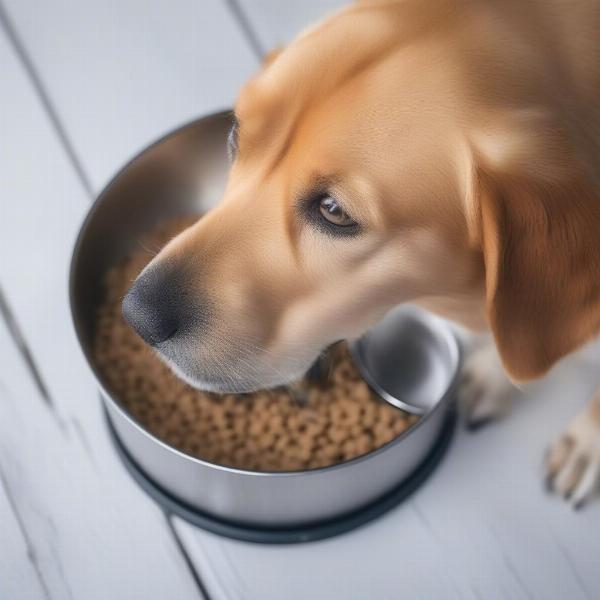Frozen fresh dog food has become increasingly popular amongst dog owners seeking a convenient yet nutritious diet for their furry friends. This guide delves into the benefits, considerations, and everything you need to know about incorporating frozen fresh dog food into your dog’s meal plan.
Frozen fresh dog food offers a compelling alternative to traditional kibble and canned food. It typically consists of raw ingredients that have been gently cooked and then quickly frozen to preserve their nutritional value. This minimal processing helps retain essential vitamins, minerals, and enzymes that can be lost during extensive heat treatments. Unlike raw food diets, the cooking process in frozen fresh food eliminates the risk of harmful bacteria like Salmonella and E. coli, providing a safer option for your dog.
The Nutritional Advantages of Frozen Fresh Dog Food
One of the key benefits of frozen fresh dog food is its higher nutritional content compared to many kibble brands. Many commercial kibbles rely on fillers and artificial preservatives, whereas frozen fresh options prioritize whole ingredients like meat, vegetables, and fruits. This results in a diet richer in protein, essential fatty acids, and natural antioxidants, which can contribute to a healthier coat, improved digestion, and increased energy levels.
Choosing the Right Frozen Fresh Dog Food
With the growing popularity of frozen fresh dog food, numerous brands have entered the market. Selecting the right one for your dog can feel overwhelming. Look for brands that use high-quality, human-grade ingredients and avoid artificial additives, preservatives, and fillers. Consider your dog’s age, breed, activity level, and any specific dietary needs or allergies when making your choice. Consulting with your veterinarian can also help you determine the appropriate nutritional profile and portion sizes for your furry companion.
Transitioning Your Dog to Frozen Fresh Food
When switching your dog to frozen fresh food, a gradual transition is crucial to avoid digestive upset. Start by mixing a small amount of the new food with their current diet and gradually increase the proportion of frozen fresh food over several days. Monitor your dog closely for any signs of digestive issues, such as vomiting or diarrhea, and adjust the transition period accordingly. can you freeze cooked hot dogs discusses freezing other types of dog food which can be helpful during the transition.
 A dog happily eating frozen fresh food
A dog happily eating frozen fresh food
Storage and Handling of Frozen Fresh Dog Food
Proper storage is essential to maintain the quality and safety of frozen fresh dog food. Store the food in a freezer until ready to use. Thaw individual portions in the refrigerator overnight or in a bowl of cold water. Never thaw frozen fresh food at room temperature, as this can promote bacterial growth. Once thawed, the food should be treated like any other fresh food and refrigerated, ideally consumed within a few days. disney dog bowls provides information on appropriate bowls to use for serving this type of food.
Is Frozen Fresh Dog Food Right for Your Dog?
“Frozen fresh dog food offers a convenient and nutritious option for many dogs,” says Dr. Emily Carter, DVM. “Its higher nutritional value compared to traditional kibble can contribute significantly to a dog’s overall health and well-being.” However, she adds, “It’s important to choose a high-quality brand and consult with your veterinarian to ensure it meets your dog’s specific dietary needs.”
Conclusion
Frozen fresh dog food provides a compelling option for dog owners seeking a healthy, convenient, and palatable diet. By understanding the benefits, considerations, and proper handling procedures, you can make an informed decision about whether this increasingly popular feeding option is the right choice for your canine companion. Remember to always consult your veterinarian before making any significant changes to your dog’s diet. cool dog bowls could offer additional advice on transitioning your dog’s feeding habits.
FAQ
- Is frozen fresh dog food the same as raw dog food? No, frozen fresh dog food is gently cooked before freezing, eliminating the risk of harmful bacteria associated with raw diets.
- How do I thaw frozen fresh dog food? Thaw portions in the refrigerator overnight or in a bowl of cold water. Never thaw at room temperature.
- How long can thawed frozen fresh food be stored? Treat it like any fresh food and refrigerate, consuming it within a few days.
- Is frozen fresh dog food more expensive than kibble? Generally, yes, due to higher quality ingredients and minimal processing.
- Can puppies eat frozen fresh dog food? Yes, but choose a formula specifically designed for puppies.
- What if my dog doesn’t like frozen fresh food? Try different brands or protein sources to find one your dog enjoys. puppy dog birthday party might have some tasty frozen treat options for your puppy.
- Is frozen fresh food suitable for all dog breeds? Yes, but consult your vet to determine the best formula and portion size for your dog’s specific needs.
ILM Dog is a leading international online resource dedicated to providing dog owners with expert advice on all aspects of dog care and well-being. From breed selection and puppy care to senior dog health and training tips, ILM Dog offers a wealth of reliable information. Our team of experienced writers and dog experts are passionate about helping you provide the best possible care for your furry friend. Contact us today for any inquiries: Email: [email protected], Phone: +44 20-3965-8624.